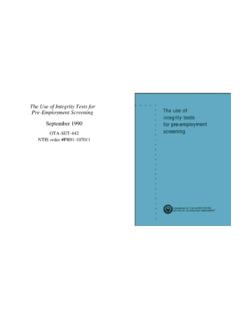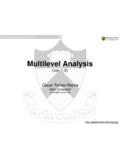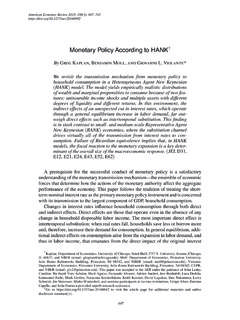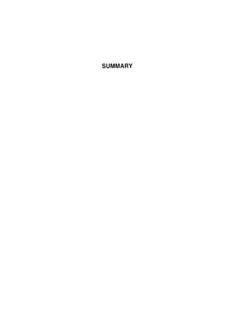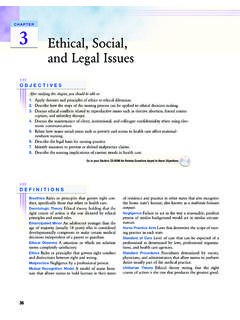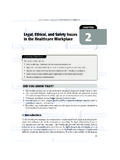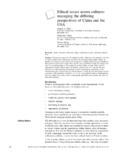Transcription of Ethics in the Economy - Princeton University
1 8 Ethics in the Economy VIVIANA A. ZELIZER* Ethik in der konomie economic sociologists lack coherent theories concerning how ethical disputes arise within economic life, and what effects their management has on organizational performance. Using formal codes of Ethics within firms as its disciplined focus, we can develop a preliminary conceptualization of Ethics in or-ganizations, a series of hypotheses about how codes work, and a preliminary sketch of a reesearch program that follows from these principles.
2 Keywords: Ethics , Codes, Enforcement, Organizational Performance 1. Introduction In 2003, an ailing Boeing corporation brought back from retirement former president Harry Stonecipher to turn the company around. Amid a flurry of reforms, the now CEO Stonecipher installed a code of company Ethics to publicize the firm s new self-discipline. Only two years later, however, he fell afoul of his own reforms. One provi-sion of the new Ethics code stipulated that employees will not engage in conduct or activity that may raise questions as to the company s honesty, impartiality, or reputa-tion or otherwise cause embarrassment to the company (5).
3 1 As newspapers around the US reported, Stonecipher did embarrass Boeing. He carried on an affair with a divorced female executive. After an anonymous informant within the company disclosed evidence of the relationship, including some steamy emails, to the heads of the company s legal and ethical departments, Boeing s board of directors decided that the 68-year old Stonecipher, long married and with grown children, had to go. Stonecipher had violated the very code of Ethics the company had put in place on his arrival in office.
4 As he said later: We set hell, I set a higher standard here. I violated my own standards. I used poor judgment .2 The collapse of Enron and other 21st-century business scandals have kept violations of ethical codes in headlines. Ethics and economic activity seem to be uneasy companions. If economic activity centers on the maximization of efficiency in production, consumption, distribution, _____ * Viviana A. Zelizer is Lloyd Cotsen '50 Professor of Sociology at Princeton University 120 Walla-ce Hall, Princeton University Princeton , N.
5 J. 08544, phone: +1-(0)609-258-4557, fax: +1(0)-609-258-2180, email: fields of expertise: economic sociology, historical ana-lysis, interpersonal relations, childhood. 1 Viewed July 19, 2006. 2 Viewed July 18, 2006. zfwu 8/1 (2007), 8-23 9 and transfers of assets, what place can it allow for ethical concerns? Institutional eco-nomics offers a useful reply: among the institutions that stabilize economies, lower transaction costs, and assure commitments, formally enacted rules of good behavior play a significant part.
6 This paper pursues that insight by identifying a series of intersections between Ethics and economic activity. Despite the frequency with which CEOs speak of Ethics and business schools teach courses on the subject, researchers have so far produced no more than scattered findings on how ethical questions actually arise within economic life, how economic actors respond to them, and what effects those responses have on economic performances. The paper therefore concentrates on identifying salient re-search questions and then closes with concrete suggestions concerning the sort of inquiries that would produce better answers than are now available.
7 What do we mean by ethical questions? The Oxford English Dictionary defines Ethics as the science of morals: the department of study concerned with the principles of human duty . In economic activity then Ethics concerns the proper way of conducting production, consumption, distribution, and transfer of assets. For instance, ethical questions turn out in such varied forms as: is it right to pay women for their eggs? Is it wrong for a supervisor to make sexual advances to an employee?
8 May a CEO legiti-mately issue public reports exaggerating a firm s economic performance? Is it appro-priate for company executives to use company jets for personal trips? More generally, is it feasible to set rules that eliminate conflicts of interest between a person s corpo-rate responsibility and private interests? May a lawyer appropriately use confidential information from a client to make profitable investments? May a psychiatrist who learns about a patient s embezzlement on the job appropriately withhold that informa-tion from an employer or the police?
9 These are everyday questions in economic life. Within business circles people have had a field day with issues of Ethics . In his introduction to a 2006/2007 annual collec-tion on business Ethics , John E. Richardson declares: Recent events have brought Ethics to the forefront as a topic of discussion throughout our nation. And, undoubtedly, the area of society that is getting the closest scrutiny regarding its ethical practices is the business sector. As corporate America struggles to find its ethical identity in a business environment that grows increasingly complex, managers are confronted with some poignant ques-tions that have definite ethical ramifications.
10 Does a company have any obliga-tion to help solve social problems such as poverty, pollution, and urban decay? What ethical responsibilities should a multinational corporation assume in for-eign countries? What obligation does a manufacturer have to the consumer with respect to product defects and safety? (Richardson 2007: iv) economic Ethics have also preoccupied moral philosophers and feminist thinkers ( Anderson 1993; Buchanan 1985; Gilligan 1982; Held 2005; Larson/Freeman 1997; Tronto 1993).

